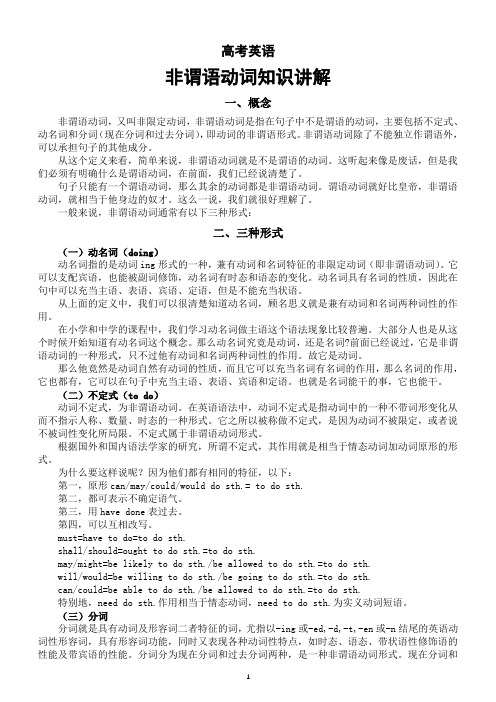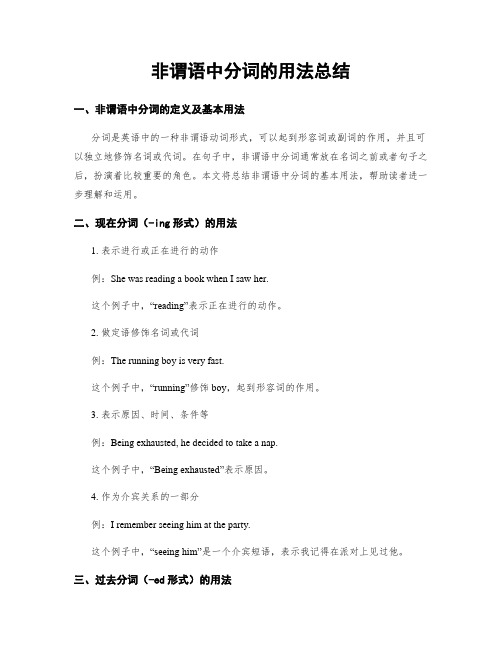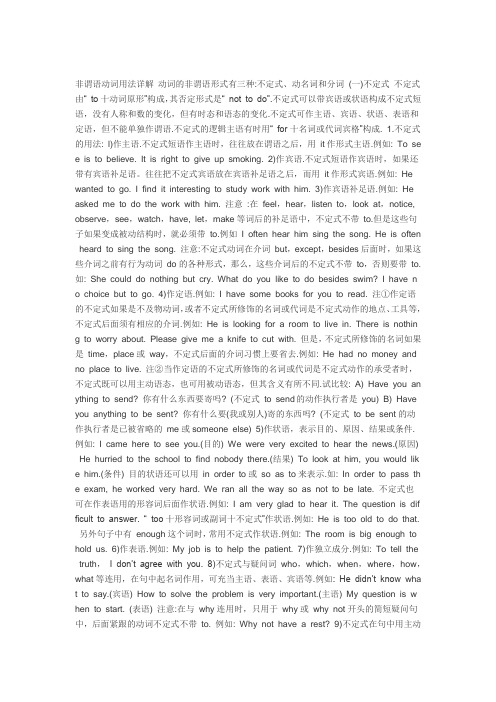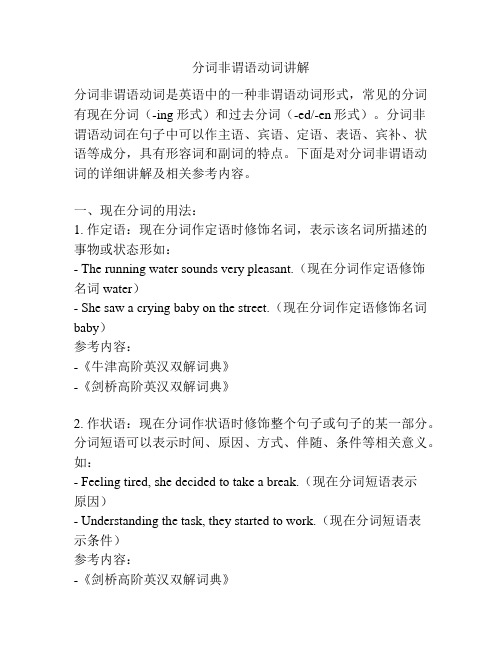非谓语动词讲解(三)------分词
高中英语高考复习非谓语动词知识讲解

高考英语非谓语动词知识讲解一、概念非谓语动词,又叫非限定动词,非谓语动词是指在句子中不是谓语的动词,主要包括不定式、动名词和分词(现在分词和过去分词),即动词的非谓语形式。
非谓语动词除了不能独立作谓语外,可以承担句子的其他成分。
从这个定义来看,简单来说,非谓语动词就是不是谓语的动词。
这听起来像是废话,但是我们必须有明确什么是谓语动词,在前面,我们已经说清楚了。
句子只能有一个谓语动词,那么其余的动词都是非谓语动词。
谓语动词就好比皇帝,非谓语动词,就相当于他身边的奴才。
这么一说,我们就很好理解了。
一般来说,非谓语动词通常有以下三种形式:二、三种形式(一)动名词(doing)动名词指的是动词ing形式的一种,兼有动词和名词特征的非限定动词(即非谓语动词)。
它可以支配宾语,也能被副词修饰,动名词有时态和语态的变化。
动名词具有名词的性质,因此在句中可以充当主语、表语、宾语、定语,但是不能充当状语。
从上面的定义中,我们可以很清楚知道动名词,顾名思义就是兼有动词和名词两种词性的作用。
在小学和中学的课程中,我们学习动名词做主语这个语法现象比较普遍。
大部分人也是从这个时候开始知道有动名词这个概念。
那么动名词究竟是动词,还是名词?前面已经说过,它是非谓语动词的一种形式,只不过他有动词和名词两种词性的作用。
故它是动词。
那么他竟然是动词自然有动词的性质,而且它可以充当名词有名词的作用,那么名词的作用,它也都有,它可以在句子中充当主语、表语、宾语和定语。
也就是名词能干的事,它也能干。
(二)不定式(to do)动词不定式,为非谓语动词。
在英语语法中,动词不定式是指动词中的一种不带词形变化从而不指示人称、数量、时态的一种形式。
它之所以被称做不定式,是因为动词不被限定,或者说不被词性变化所局限。
不定式属于非谓语动词形式。
根据国外和国内语法学家的研究,所谓不定式,其作用就是相当于情态动词加动词原形的形式。
为什么要这样说呢?因为他们都有相同的特征,以下:第一,原形can/may/could/would do sth.= to do sth.第二,都可表示不确定语气。
非谓语中分词的用法总结

非谓语中分词的用法总结一、非谓语中分词的定义及基本用法分词是英语中的一种非谓语动词形式,可以起到形容词或副词的作用,并且可以独立地修饰名词或代词。
在句子中,非谓语中分词通常放在名词之前或者句子之后,扮演着比较重要的角色。
本文将总结非谓语中分词的基本用法,帮助读者进一步理解和运用。
二、现在分词(-ing形式)的用法1. 表示进行或正在进行的动作例:She was reading a book when I saw her.这个例子中,“reading”表示正在进行的动作。
2. 做定语修饰名词或代词例:The running boy is very fast.这个例子中,“running”修饰boy,起到形容词的作用。
3. 表示原因、时间、条件等例:Being exhausted, he decided to take a nap.这个例子中,“Being exhausted”表示原因。
4. 作为介宾关系的一部分例:I remember seeing him at the party.这个例子中,“seeing him”是一个介宾短语,表示我记得在派对上见过他。
三、过去分词(-ed形式)的用法1. 表示被动意义例:The window was broken by a stray ball.这个例子中,“broken”表示被动的意义。
2. 做定语修饰名词或代词例:I have lost my keys.这个例子中,“lost”修饰keys,起到形容词的作用。
3. 表示完成或完成的结果例:The report has been submitted.这个例子中,“submitted”表示完成了某个动作。
4. 作为介宾关系的一部分例:We had a lot of fun playing games at the party.这个例子中,“playing games”是一个介宾短语,表示我们在派对上玩游戏时度过了很多乐趣。
非谓语动词-分词

4. Being used by me now, the bike can’t be lent to you.
(由于)正在被我使用, 这辆自行车不能借给你。
Being struck by the heavy storm, they felt helpless. (因为)正被猛烈的暴风雨袭击,他们感到很无助。
Ⅱ 分词的用法
一.作表语
1. 过去分词作表语,表示主语所处的状态
The window is broken. 窗户破了。 The train is crowded. 火车很拥挤。 She is excited. 她很激动。
2. 现在分词表示主语的特征或属性,通常物作主语, “令人...”
过去分词表示主语的状态,通常人作主语, “感到...”
a drowning man 快要淹死的 a drowned man 已经淹死的
falling leaves fallen leaves
正在飘落的树叶 落叶
2. 分词作后置定语
分词 doing
分词和被修饰的名词 的主被关系
主动关系
being done
被动关系
分词在时间上的意义
表示正在进行或 习惯性动作
完成式
(not ) having (not ) having been
done
done
过去分词: 一般只有一种形式:done
Ⅰ 分词的时态和语态
一. 现在分词的时态变化:
1) 现在分词的一般式:
表示动作与谓语动词同时发生,或几乎同 时发生。
当(他)正在路上走的时候,他发现了一支钢笔。
Walking along the street, he found a pen. (同时发生 )
非谓语动词用法详解 动词的非谓语形式有三种

非谓语动词用法详解动词的非谓语形式有三种:不定式、动名词和分词(一)不定式不定式由“ to十动词原形”构成,其否定形式是“ not to do”.不定式可以带宾语或状语构成不定式短语,没有人称和数的变化,但有时态和语态的变化.不定式可作主语、宾语、状语、表语和定语,但不能单独作谓语.不定式的逻辑主语有时用“ for十名词或代词宾格”构成. 1.不定式的用法: l)作主语.不定式短语作主语时,往往放在谓语之后,用it作形式主语.例如: To se e is to believe. It is right to give up smoking. 2)作宾语.不定式短语作宾语时,如果还带有宾语补足语。
往往把不定式宾语放在宾语补足语之后,而用it作形式宾语.例如: He wanted to go. I find it interesting to study work with him. 3)作宾语补足语.例如: He asked me to do the work with him. 注意:在feel,hear,listen to,look at,notice, observe,see,watch,have, let,make等词后的补足语中,不定式不带to.但是这些句子如果变成被动结构时,就必须带to.例如I often hear him sing the song. He is often heard to sing the song. 注意:不定式动词在介词but,except,besides后面时,如果这些介词之前有行为动词do的各种形式,那么,这些介词后的不定式不带to,否则要带to.如: She could do nothing but cry. What do you like to do besides swim? I have n o choice but to go. 4)作定语.例如: I have some books for you to read. 注①作定语的不定式如果是不及物动词,或者不定式所修饰的名词或代词是不定式动作的地点、工具等,不定式后面须有相应的介词.例如: He is looking for a room to live in. There is nothin g to worry about. Please give me a knife to cut with. 但是,不定式所修饰的名词如果是time,place或way,不定式后面的介词习惯上要省去.例如: He had no money and no place to live. 注②当作定语的不定式所修饰的名词或代词是不定式动作的承受者时,不定式既可以用主动语态,也可用被动语态,但其含义有所不同.试比较: A) Have you an ything to send? 你有什么东西要寄吗? (不定式to send的动作执行者是you) B) Have you anything to be sent? 你有什么要(我或别人)寄的东西吗? (不定式to be sent的动作执行者是已被省略的me或someone else) 5)作状语,表示目的、原因、结果或条件.例如: I came here to see you.(目的) We were very excited to hear the news.(原因) He hurried to the school to find nobody there.(结果) To look at him, you would lik e him.(条件) 目的状语还可以用in order to或so as to来表示.如: In order to pass th e exam, he worked very hard. We ran all the way so as not to be late. 不定式也可在作表语用的形容词后面作状语.例如: I am very glad to hear it. The question is dif ficult to answer. “ too十形容词或副词十不定式”作状语.例如: He is too old to do that.另外句子中有enough这个词时,常用不定式作状语.例如: The room is big enough to hold us. 6)作表语.例如: My job is to help the patient. 7)作独立成分.例如: To tell the truth,I don’t agree with you. 8)不定式与疑问词who,which,when,where,how,what等连用,在句中起名词作用,可充当主语、表语、宾语等.例如: He didn’t know wha t to say.(宾语) How to solve the problem is very important.(主语) My question is w hen to start. (表语) 注意:在与why连用时,只用于why或why not开头的简短疑问句中,后面紧跟的动词不定式不带to. 例如: Why not have a rest? 9)不定式在句中用主动式还是被动式。
(完整版)名词的非谓语动词形式讲解

(完整版)名词的非谓语动词形式讲解名词的非谓语动词形式是指名词在句子中充当动词而不是名词的功能。
非谓语动词有三种形式:不定式、现在分词和过去分词。
1. 不定式不定式是名词最常见的非谓语动词形式之一。
不定式可以表示目的、愿望、惯以及某些特定的动作或状态。
不定式的形式是“to + 动词原形”。
例如:- I want to go to the beach.(我想去海滩。
)- He likes to play basketball.(他喜欢打篮球。
)2. 现在分词现在分词是动词的一种形式,可以用作形容词或者动词。
现在分词的形式是动词原形加上-ing。
在名词中,现在分词用于描述正在进行的动作或者具有特定特征的人或物。
例如:- The running man is my brother.(那个跑步的人是我哥哥。
)- The interesting book is on the table.(有趣的书在桌子上。
)3. 过去分词过去分词是动词的一种形式,常用作形容词,表示完成的动作或状态。
过去分词的形式有规律变化和不规则变化。
在名词中,过去分词也用于描述或修饰人或物。
例如:- The broken vase was expensive.(那个破损的花瓶很贵。
)- She is interested in the written article.(她对那篇书面文章很感兴趣。
)综上所述,名词的非谓语动词形式主要包括不定式、现在分词和过去分词。
掌握这些形式的用法和规则可以帮助我们更准确地表达自己的意思,并丰富我们的语言表达能力。
*注意:以上内容仅供参考,具体语法使用请根据具体语境和句子结构进行判断和运用。
*。
分词非谓语动词讲解

分词非谓语动词讲解分词非谓语动词是英语中的一种非谓语动词形式,常见的分词有现在分词(-ing形式)和过去分词(-ed/-en形式)。
分词非谓语动词在句子中可以作主语、宾语、定语、表语、宾补、状语等成分,具有形容词和副词的特点。
下面是对分词非谓语动词的详细讲解及相关参考内容。
一、现在分词的用法:1. 作定语:现在分词作定语时修饰名词,表示该名词所描述的事物或状态形如:- The running water sounds very pleasant.(现在分词作定语修饰名词water)- She saw a crying baby on the street.(现在分词作定语修饰名词baby)参考内容:-《牛津高阶英汉双解词典》-《剑桥高阶英汉双解词典》2. 作状语:现在分词作状语时修饰整个句子或句子的某一部分。
分词短语可以表示时间、原因、方式、伴随、条件等相关意义。
如:- Feeling tired, she decided to take a break.(现在分词短语表示原因)- Understanding the task, they started to work.(现在分词短语表示条件)参考内容:-《剑桥高阶英汉双解词典》-《英汉大词典》二、过去分词的用法:1. 作定语:过去分词在句中作定语时,修饰名词,表示该名词被动、完成或被描述的状态,如:- The broken vase needs to be repaired.(过去分词作定语修饰名词vase)- The information provided is accurate.(过去分词作定语修饰名词information)参考内容:-《朗文当代高级英语辞典》-《剑桥国际英语高级词典》2. 作表语:过去分词可以作表语,表示主语的状态或特征,如:- He is interested in the books written by the famous author.(过去分词作表语修饰主语)- The glass is broken.(过去分词作表语修饰主语)参考内容:-《剑桥高阶英汉双解词典》-《牛津高阶英汉双解词典》三、分词作宾补的用法:分词非谓语动词可以作及物动词的宾语补足语,表示被动、完成的意义,如:- She found the door locked.(分词作宾补修饰宾语door)- They heard the news announced on the radio.(分词作宾补修饰宾语news)参考内容:-《韦氏英语用法词典》-《剑桥高阶英汉双解词典》综上所述,分词非谓语动词的用法主要包括现在分词作定语、状语,过去分词作定语、表语和宾补等。
非谓语动词讲解史上最全

非谓语动词讲解史上最全非谓语动词是英语中的一种特殊动词形式,它们在句子中通常不具备时态和人称的变化。
非谓语动词包括不定式、动名词和现在分词。
一、不定式(Infinitive)不定式由to加动词原形构成,具有动词和名词的双重特征。
不定式在句子中可以作主语、宾语、表语、定语、状语等成分。
1. 作主语:To learn a foreign language is beneficial to your career.学习一门外语对你的事业有益。
2. 作宾语:I want to visit my grandparents this weekend.我想这周末去看望我的祖父母。
3. 作表语:His dream is to become a famous writer.他的梦想是成为一名著名的作家。
4. 作定语:She has many books to read.她有很多书要读。
5. 作状语:He came to help us.他来帮助我们。
二、动名词(Gerund)动名词由动词原形加-ing构成,具有动词和名词的双重特征。
动名词在句子中可以充当主语、宾语、表语、定语、状语等成分。
1. 作主语:Swimming is my favorite sport.游泳是我最喜欢的运动。
2. 作宾语:I enjoy reading novels in my free time.我喜欢在空闲时间读小说。
3. 作表语:Her hobby is singing.她的爱好是唱歌。
4. 作定语:The running water is clear.流动的水很清澈。
5. 作状语:She went shopping after finishing her homework.她在完成作业后去购物。
三、现在分词(Present Participle)现在分词由动词原形加-ing构成,具有动词和形容词的双重特征。
现在分词在句子中可以充当定语、表语、状语等成分。
非谓语动词分词的用法总结

非谓语动词分词的用法总结一、非谓语动词分词的基本概念及形式非谓语动词分词是英语中的一种特殊用法,常用来表达被动、完成、主动等不同含义。
在句子中作为定语、状语或补语,并且有时可以替代从句。
它的形式通常为“过去分词”或“现在分词”,具体使用取决于上下文和句子结构。
1. 过去分词过去分词通常由动词原形后加上-ed或-d构成,如:played, taken, finished等。
它可以表示被动意义,也可以表示稍微延续的状态或完成的行为。
2. 现在分词现在分词通常由动词原形后加-ing构成,如:playing, taking, working等。
它可以表示主动进行的行为,同时也具有形容词性质。
二、非谓语动词分词作定语非谓语动词分词可以用作定语来修饰名词,起到进一步说明、限定名次的作用。
1. 过去分词作定语过去分词作为定语时,通常修饰被其所描述的名次,如:broken heart (破碎的心) ,cooked rice (煮熟的米饭)等。
它可以表示被动或完成的状态。
2. 现在分词作定语现在分词作为定语时,通常修饰与之相关的名次,并且描述正在进行或主动发生的行为,如:a running river (奔流的河流) ,a barking dog (叫唤的狗)等。
三、非谓语动词分词作状语非谓语动词分词可以用作状语来修饰句子、从句或名词短语,起到表示时间、原因、方式、条件等不同功能的作用。
1. 过去分词作状语过去分词作为状语时,可以表示原因、结果、条件、时间等。
例如:Having finished his homework, he went out to play. (完成了家庭作业后,他出去玩了)2. 现在分词作状语现在分词作为状语时,可以表达同时进行、原因、方式等含义。
例如:Walking slowly, she enjoyed the beautiful scenery. (慢慢地走着,她欣赏美丽的风景)四、非谓语动词分词作补语非谓语动词分词还可以用来充当及物动词的宾补或形容词的补足语,起到补充说明、进一步描述的作用。
- 1、下载文档前请自行甄别文档内容的完整性,平台不提供额外的编辑、内容补充、找答案等附加服务。
- 2、"仅部分预览"的文档,不可在线预览部分如存在完整性等问题,可反馈申请退款(可完整预览的文档不适用该条件!)。
- 3、如文档侵犯您的权益,请联系客服反馈,我们会尽快为您处理(人工客服工作时间:9:00-18:30)。
用分词和定语从句两种形式填空:① There was a wallet _______ 或__________ (lie ) one the ground. ② An man ___________ 或 __________ (ride) a horse came from the front. ③ The lady ___________ 或 __________ (take) with your teacher is a nurse.④ The lake ___________ 或 __________ (lie ) on the west of Hang Zhou is called the west lake. ⑤ Mr smith once hired a young worker ___________ 或 __________ (call) John. ⑥ The book, ___________ 或 __________ (complete 完成 ) in May , sells well. ⑦ This is a ___________ 或 __________ (develop 发达 ) area.⑧ They took the ___________ 或 __________ (wound 受伤 ) soldiers into a small temple at once. ⑨ The Chinese people are __________________ 或 _______________(hard —work 勤劳) ⑩ The _______________ 或 ______________(man –make) satellite will move round the earth. ⑪ I found a ______________ 或 ______________(break) cup on the table.⑫ Any person ________________ 或 _____________( disagree) must write down his name on the paper. ⑬ Most of people ______________ 或 _____________(sing) were students. ⑭ Here was no Frenchman ______________ 或 ____________ (speak) English . ⑮ The room temperature _________________ 或 _____________(need) is 15’C. ⑯ The method 方法_______(use) is efficient.⑰ Her __________________(disappoint) laugh came out at once. ⑱ The train just now ________(arrive) at Platform No.4 is from Beijing .区别 1) The student ___________( criticize 批评) is in Class One tomorrow.2) The student ___________( criticize 批评) is in Class One now.改错 ①She told me why to not come in time②I can let you to have one ticket.③It made the girl who was standing at the gate to feel better. ④We’ll have the boy to post this letter. ⑤Was the thief noticed leave the house? ⑥He made the girl light a fire for us .⑦He made some fish food to feed the dog. ⑧The girl was made learn English song.⑨A student began to make faces make the other students laugh. ⑩Who left the water run all the time? ⑾The good news sent him fly home . ⑿we found them read in the classroom. 写出不同的动词形式① We saw you _____( fight) on the side of the birds just now. ② They found him ______ (die) at the foot of the hill. ③ Her father found her ________(injure 受伤) in her arm. ④ It’s Lifang who had it ___________(do ).⑤ The teacher tried to make himself _________( understand) ⑥ They sent me ________ (read) the book.⑦ We watched the ship ___________( steam 开动) past. ⑧ We caught the visitor _________( tell) a lie.⑨ He couldn’t make his voice ________(hear)about the noise of the traffic. ⑩ we must get everything _______(move 运转)。
⑪ I can’t have you _______(do) nothing all day. ⑫ Did you noticed his hand ______( shake 摇动)?1.The young lady stood _____ for a moment when she saw a beggar before he suddenly.A, surprising B, to surprise C, surprised D, having surprised2, ---- How did you find your visit to the museum ?---- I thoroughly enjoyed it , It was ______.A, far more interesting B, even much interested C, so more interesting D, a lot much interested3. They thought their bodies would be _______kept in the pyramids.A. well b. quite C very D. much4. The play was so _____ that nearly everybody was _______ to tears(眼泪).A. moving , movingB. moved, movedC. moving, movedD. moved , moving5. With his son ________ , the man felt angry.A. disappointingB. disappointedC. being disappointedD. disappoint6. “ you are too ________ “, said the _______ mother to his son.A. disappointing、disappointedB. disappointed、disappointedC. disappointed 、disappointing改错:The puzzling look on his face suggested that he should understand the question.The surprising look s howed that he hadn’t expected this.Then came her exciting scream of joy.分词做状语用;doing 、done、being done、having done、having been done、填写下列各词:①______________(feel) tired, the teacher lay on the ground.②______________(be) blind , how could they see an elephant.③Not ____________ (receive) an answer, he decided to write another letter.④____________( born )into a poor family, he had only two years of schooling.⑤______________( tire) with the work, she sat down to rest.⑥______________(wound) in the leg. The soldier had to lie in bed.⑦__________(not satisfy) with the result, we decided to make the experiment again.⑧___________( discourage), I started to leave the place.⑨________(see) from the hill, the city looks beautiful.⑩____________ (walk) along the sands towards his car, he saw a stranger.⑪Be careful when _____________(cross) the street.⑫His wife died in 1980, _________(leave) him with three children.⑬_________(give) more time, we are sure to finish it.⑭____________( support) by the people , we succeeded at last.⑮The bus was held up by the snow storm, ________( cause) the delay(延期).⑯The boy jumped up and down, ____________(cry) with joy.⑰________( hold) his head high, he walked past the pole.⑱The train started at five, ____________( arrive) at qingyuan at 12.⑲He must be able to use the foreign language, ____________ (forget) all about his own.改错:①Reading the letter, tears came to his eyes.②Looking at from the top of the hill, our town looks even more beautiful.③Seeing his hometown, a sense of pride came to his mind.④Being very hot , they went swimming in the river,⑤Walking through the park, a wonderful smell of flowers came to our nose..⑥They set off at four, and arriving home an hour later.⑦Done his homework, the boy went out to play.⑧Having written his composition, so he began to watch TV.⑨The boy being dressed in red coat is my son.⑩I don’t know the boy was born in 1986.⑪The spoken English countries are developed country in the world .⑫_______ his accent , he must be form the south.A.Judging from B, Judged from C. Having judged about D. Judging of分词时态综合练习:1.He was knocked down by a car __________(run) in the street.2. He showed us around the house ___________(build) there now.3. There is a tree __________(stand) in front of our house.4. __________(do) his work he went home .5.___________( criticize 批评) by the teacher, he felt very unhappy.6._____________( write ) his composition, he began to do his maths homework.7.____________(not know) what to do next, he went to his teacher for adviee.8.__________(be) a student , you should study hard.9.___________(be) there many times, I know the place very well.11, __________(see) the film many times, he didn’t go to see it last night.13,________________(tell) many times, he still couldn’t remember it .14, _________( stand) on top of the mountain, you can see the village more clearly.15, This is the problem ______________(discuss) at yesterday’s meeting.17. ____________( heat) , water can be turned into gases.18._____________(see) from the top of the hill, the town looks even more beautiful.20. The old man stood here,________(support) by his daughter.21. He sat there, ____________(lose) in thought.22.___________( praise表扬) by the teacher at the meeting, he felt very happy.24. He hurried home, ___________( look) behind him as he went.25.___________ (arrive) at the airport, I was told that my flight had taken off.26.___________(hear) the news, we jumped with joy.27,The question ______________( discuss) is of great importance.28.____________(invite) to speak, I ‘ll start making some preparation tomorrow.分词综合练习(测验, 每题3分)1、They sent the __________ man to the hospital at once.A/ dead B. died C. dying D. being dead2. When I put my hand on his chest, I could feel his heart still _____.A/ beat B. beating C. beaten D. to beat3. Most of the people ____ to the party were famous scientists.A/ invited B/ to invite C/ being invited D/ inviting4, The next morning she found the man _____ in bed ,dead.A/ lying B/ lie C/ lay D/ laying5. We were all so pleased to see the trees _______ so well.A/ grow C, grown B /growing D/ having grown6, ——Good morning, can I help you ? ----- I’d like t have his package_________A. be weighed B/ to be weighed C/ to weight D/ weighed7, ______ more attention , the trees could have frown better.A/ Given B/ To give C/ Giving D/ Having given8, The murderer was brought in, with his bands ______ behind his back.A/ being tied B/ having tied C/ to be tied D/ tied9, ________ a reply, he decided to write again.A/ Not receiving B, Receiving not C. Not having received D. having not received10, Never have I seen the word _____this way.A, use B, using C, used D, to be used11. The child stood on the sands, ____in wonder at his first sight of the sea.A, losing B, lost C, to be lost D, having lost12. What he said made us deeply ________.A/ move B, moving C, moved D, be moved13.What’s the language ______ in Germany ?A. to speak B, spoken C, speaking D, to be spoken14, The students are kept busy _____ for the term examination.A/ to prepare B, to be preparing C/ preparing D, prepare15, Looking through the window, I found him _______ in a sofa.A/ to seat b/ seat c/ seating D, seated16, Seeing water ________ out of the broken pipe , he stopped to repair it.A/ bursting B /burst C, being burst D ,having been burst17. I have only w\two dollars ____ in my pockets.A/ remaining B, remained C, remain D, to be remained18. The man stood there, his sharp eyes _____on my face.A/ fix B, being fixed C, fixed D, fixing19. The victory sent the soldiers’ spirits _______A. risen b/ rising C, raising D, raised20 Bob was the only one I ‘d have ______ with me .A, to work B, working C, worked D, him work21. Playing with the fire, the boy got his trousers ______.A, burn B ,burning C, burnt D, being burnt22, You’re having a fever. Your head feels ______ hot.A, burnt B, burning C, burn D, being burnt23. He told me he’d lost his job, which was something I _________for.A, Was not preparing B, had not prepared C, Was not prepared D/ has not prepared 24. Don’t worry. It’s quite safe skating on the ____ lake.A, freezing B, frozen C, freeze D, having frozen25, ---Why have you been so quiet? ------ His words have left me _____.A/ think B, to think C, thinking D, thought26, Once _____ alone , the girl started crying again.A, leaving B, left C, being left D, having left27. Who is the girl _____ in red ?A, dressing B, wearing C, dressed D, worn28. _______ a good lesson, the boy never dared to make trouble again.A, Teaching B, Taught C, Having taught D, Having been taught29. The bus rolled into the valley, _____ ten deaths and more wounded.A/ to cause B, caused C causing D, having caused30. Generally _____ , English is not difficult to earn.A, speaking B, to speak C ,spoken D, speak31. The letter arrived a week later than ______A, expected B, being expected C, expecting D, to be expected32. All things _______, your plan is practical.A. considering B, being considered C, considered D, to be considered33. The boy was scolded because he was caught _____ apples from the neighbo r’s tree.A/ to pick B, having picked C, pick D, picking。
